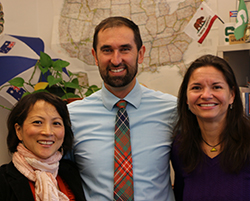Caltrans awards faculty $1.2 million to research train travel
While most Californians typically opt to hop in a car or book a flight when going from point A to point B, studies show that train travel is on the rise. The California Department of Transportation (Caltrans), which operates the state's Amtrak service, is hoping to bolster that trend.
To better understand riders' needs, Caltrans has selected Recreation, Parks, and Tourism faculty at San Francisco State University to undertake a three-year study of ridership, customer satisfaction and environmental impacts of California train travel. Another key element of the study is learning about the decision-making process of those who choose not to take trains.

Assistant Professors of Recreation, Parks, and Tourism Aiko Yoshino and Jackson Wilson are working with Associate Professor Pavlina Latkova on a study of train usage in California.
"There are lots of positives about train travel, but it is under-used in this country," said Associate Professor Pavlina Latkova, one of the project's leaders. "Train transportation is a viable option, especially in California, where the population is rapidly growing. Highways are only going to become more congested."
Latkova, who is working with Assistant Professors Jackson Wilson and Aiko Yoshino on the project, said the results of their $1,267,398 contract will give Caltrans guidance on how to attract new customers, keep existing riders satisfied with Amtrak California services and develop more eco-friendly practices. Their findings will also be used to help the state government make budget decisions.
"Part of the goal is to bring awareness to the role passenger trains play in California, which will give the government more information when distributing public funds," said Wilson, who is co-principal investigator of the project with Latkova. "Our work will help Caltrans make decisions that will influence how all of us travel."
The team's research focuses specifically on three state-supported rail corridors: the Capitol Corridor (from the East Bay to Sacramento), the San Joaquin Corridor (from Stockton to Bakersfield) and the Pacific Surfliner (from San Luis Obispo to San Diego).
For Latkova and Yoshino -- originally from Europe and Japan, where train travel is more commonplace -- the project provides the chance to tackle what Latkova describes as the "fascinating question" of why trains are not as popular in the United States.
The partnership with Caltrans also creates the opportunity for students to participate in a major research project. Two graduate students, fully funded by the contract, are assisting with data collection, evaluation and analysis. Undergraduates will also help with data collection, to be done on trains, at stations and -- to learn about those who choose to drive rather than take a train -- at highway rest stops. Spanish-speaking students will handle translations.
"This project will be valuable for Caltrans, but it is also a great opportunity for students to get their first exposure to research, since our department doesn't offer a research class at the undergraduate level," Latkova said.